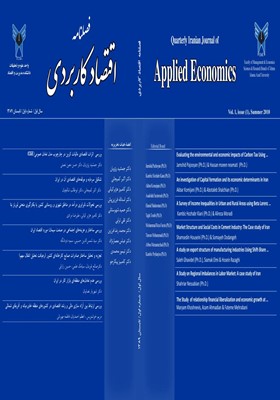بررسی مدل بیثباتی و عدم تقارن جذب سرمایهگذاری مستقیم خارجی در ایران
محورهای موضوعی : اقتصاد کاربردیکامبیز هژبر کیانی 1 , محمدرضا ناهیدی 2
1 - ندارد
2 - ندارد
کلید واژه: سرمایهگذاری مستقیم خارجی, نرخ ارز, بهرهوری نیروی کار, درجه باز بودن اقتصاد, امنیت سرمایهگذاری, الگوی واریانس ناهمسانی شرطی خو,
چکیده مقاله :
در این مطالعه مشروحا تاثیر برخی از متغیرهای کلان اقتصادی بر FDI در ایران مورد بررسی قرار میگیرد. دوره زمانی انتخابی 1352 تا 1388 و تکنیک اقتصادسنجی مورد استفاده در این مقاله، روش واریانس ناهمسانی شرطی خود توضیح تعمیمیافته (GARCH) برای شرایط بیثباتی و واریانس ناهمسانی شرطی خود توضیح تعمیم یافته قوی((PGARCH برای بررسی شرایط تقارن مدل میباشد. نتایج تخمین مدل بیانگر این است که در شرایط بی ثباتی افزایش نرخ ارز تاثیر منفی بر جذب سرمایهگذاری مستقیم خارجی داشته، در صورتی که افزایش بهرهوری نیروی کار ، امنیت سرمایهگذاری و درجه باز بودن اقتصاد تاثیر مثبت بر جذب سرمایهگذاری مستقیم خارجی دارد. نتایج تخمین مدل تحت شرایط بیثباتی به لحاظ نوع اثرگذاری متغیرهای توضیحی روی متغیر وابسته مشابه مدل کوتاه مدت و بلندمدت باثبات ولی با ضرایب متفاوت اثر گذار بوده و همچنین نشاندهنده اثر مثبت شوک ایجاد شده در شرایط بیثباتی روی کاهش خالص سرمایهگذاری مستقیم خارجی است. در مجموع، نتایج نشان دهنده اثرات نامتقارن شوک ها روی خالص سرمایهگذاری مستقیم خارجی است.
In the past few decades several countries in the world have attracted foreign direct capital as one of the instruments needed for financing the increasing level of internal investment. In this connection, the economic conditions of host countries for increasing the level of FDI have been considered as an important factor in achieving their objective. In this study, the impact of some macro-economic variables on FDI is examined in detail in Iran. The period selected is 1352-1388 years and the econometric technique used in this article is the Generalized Auto-Regressive Conditional Heteroskedasticity(GARCH) for evaluating the conditions of instability and Power Generalized Auto-Regressive Conditional Heteroskedasticity (PGARCH) for the conditions of asymmetry. The estimated results of the model show that under conditions of instability, increasing the exchange rate has a negative impact on FDI, whereas raising labor productivity, protecting investment security and keeping the degree of openness of the economy has a positive effect on attracting FDI. The estimated outcomes obtained under the unstable conditions, due to the type of impact that the explanatory variables may put on the dependent ones, are similar with those under the stable short-run and long-run model with different effective coefficients[1] and that on the other hand they show a positive effect of the shock caused under the unstable conditions on net decrease in FDI. In sum, the results show the asymmetric effects of the shocks on net FDI.


